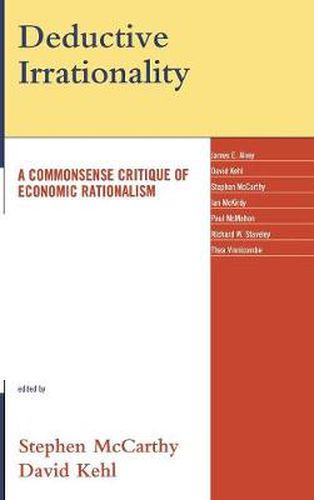Readings Newsletter
Become a Readings Member to make your shopping experience even easier.
Sign in or sign up for free!
You’re not far away from qualifying for FREE standard shipping within Australia
You’ve qualified for FREE standard shipping within Australia
The cart is loading…






Deductive Irrationality examines and critiques economic rationalism from the perspective of political philosophy. The essays in this collection analyze not only the work of founders of the discipline of economics, but also political philosophers influential in this founding and select contributors of seminal theories in modern economic thought_namely, Thomas Hobbes, John Locke, Adam Smith, Alfred Marshall, John Maynard Keynes, Friedrich Hayek, Gunnar Myrdal, Robert E. Lucas Jr., and John F. Muth. The main theme linking all of the essays together is that economics is a product of modern rationalism and shares with that rationalism the belief that the only real knowledge is scientific knowledge. Derived from a scientific method modeled on mathematics, this method gives both modern political science and modern economics their abstract character. Adam Smith’s contribution to Western thought was more than mere economics; his innovations and his variance from previous thinkers follows Machiavelli in finding human nature in the realistic conception of examining men as how they are, rather than the classical view that we should look to the idea of man’s formal excellence. To Smith, humanity emerges from a desire for self-preservation, where every worker competes to exchange the fruits of their labor with that of others. The result is a gap between the world of ‘common sense’ and the world of theory that practitioners in both fields no longer truly understand. By adopting the perspective of political philosophy, the contributors take an approach that is alien to most economists, and in doing so address many of the currents and tensions that underlie modern economic theory and, by implication, the rational choice theory in political science.
$9.00 standard shipping within Australia
FREE standard shipping within Australia for orders over $100.00
Express & International shipping calculated at checkout
Stock availability can be subject to change without notice. We recommend calling the shop or contacting our online team to check availability of low stock items. Please see our Shopping Online page for more details.
Deductive Irrationality examines and critiques economic rationalism from the perspective of political philosophy. The essays in this collection analyze not only the work of founders of the discipline of economics, but also political philosophers influential in this founding and select contributors of seminal theories in modern economic thought_namely, Thomas Hobbes, John Locke, Adam Smith, Alfred Marshall, John Maynard Keynes, Friedrich Hayek, Gunnar Myrdal, Robert E. Lucas Jr., and John F. Muth. The main theme linking all of the essays together is that economics is a product of modern rationalism and shares with that rationalism the belief that the only real knowledge is scientific knowledge. Derived from a scientific method modeled on mathematics, this method gives both modern political science and modern economics their abstract character. Adam Smith’s contribution to Western thought was more than mere economics; his innovations and his variance from previous thinkers follows Machiavelli in finding human nature in the realistic conception of examining men as how they are, rather than the classical view that we should look to the idea of man’s formal excellence. To Smith, humanity emerges from a desire for self-preservation, where every worker competes to exchange the fruits of their labor with that of others. The result is a gap between the world of ‘common sense’ and the world of theory that practitioners in both fields no longer truly understand. By adopting the perspective of political philosophy, the contributors take an approach that is alien to most economists, and in doing so address many of the currents and tensions that underlie modern economic theory and, by implication, the rational choice theory in political science.